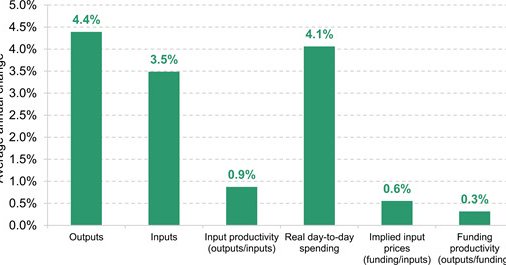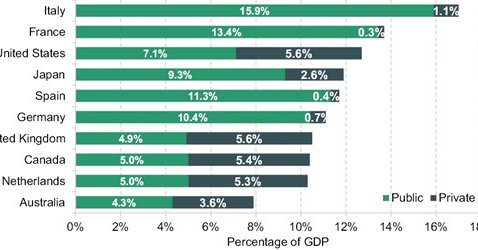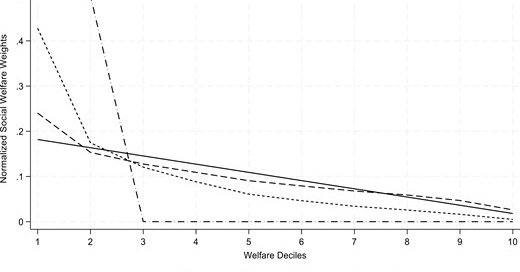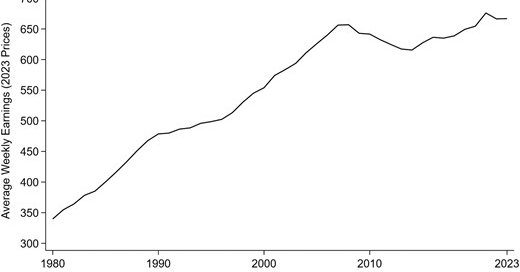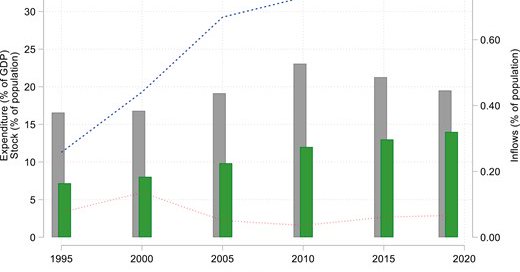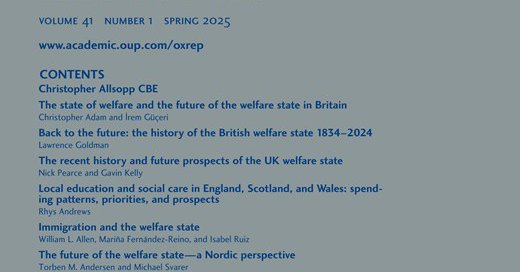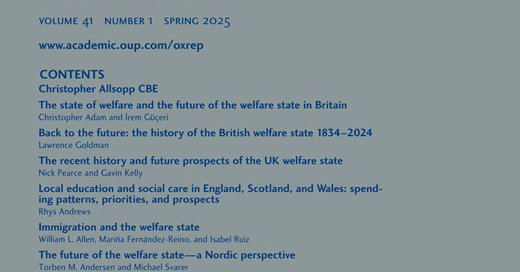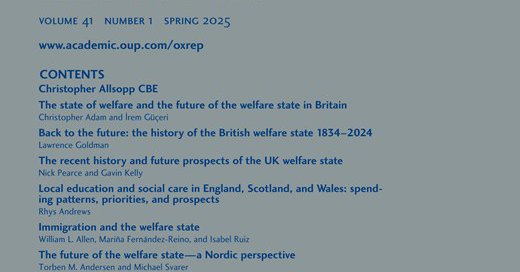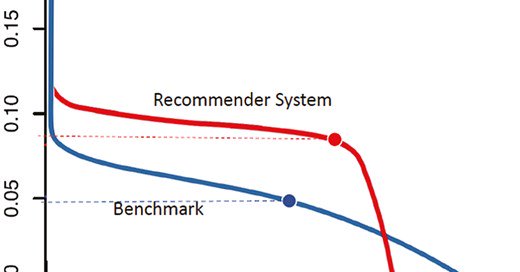
Oxford Econ Policy
@OxrepJournal
Followers
3K
Following
221
Media
1K
Statuses
4K
Peer-reviewed; bridging the gap between academic economics & policy debates since 1985. BlueSky: @oxrepjournal.bsky.social https://t.co/TypxcSUuly
Oxford, England
Joined March 2015
The OxREP's newest issue on "The Future of the Welfare State In the UK" has been published! Read all articles online here: https://t.co/Y3tEtgXLQX
0
0
1
Rising health spending threatens fiscal sustainability in England. Anita Charlesworth and @Ann__Raymond suggest that long-term funding must rely on higher taxes or private spending due to limited scope for public service cuts. #NHS #FiscalPolicy
https://t.co/DHpJUbLOa2
academic.oup.com
Abstract. Rising health spending is increasingly becoming a key concern for policy-makers across many high-income countries due to ageing populations and i
0
0
0
The UK must significantly expand health and social care supply to meet rising demand. @MaxWarnerIFS and @BenZaranko explore how to boost inputs and productivity amid policy and fiscal constraints. #HealthPolicy #SocialCare
https://t.co/kjLpg7UIOS
academic.oup.com
Abstract. The supply of health and social (long-term) care services in the UK will need to substantially increase in coming decades to meet growing demand
0
1
2
Council housing, once common and broadly accessible, now serves mainly low-income households and sees minimal new builds. Peter A. Kemp finds that social housing covers only 1 in 6 households today. #HousingPolicy #uk
https://t.co/d0rYdIVOjX
academic.oup.com
Abstract. Since 1980, social housing has undergone a fundamental transformation in England. In the 1970s, three out of ten households, the majority of whom
0
1
1
UK pensions face challenges from an ageing population. @JCribbEcon, Carl Emmerson and @Heidi_Karj argue that this implies raising pension age—hitting poorer groups hardest—or limiting ‘triple lock’ indexation, impacting higher earners more. #Pensions
academic.oup.com
Abstract. The UK state pension system faces significant challenges given the country’s ageing population, but at the same time it is crucial for retirement
1
2
2
In 2023, the UK tax-benefit system reduced income inequality by 27.6%, trailing France. Victoria Prowse shows that fiscal drag disproportionately affects low earners, while advocating for higher Universal Credit to limit inequality. #TaxPolicy #Inequality
https://t.co/SLNFzRxpe5
academic.oup.com
Abstract. This paper provides a comprehensive quantitative analysis of the UK tax-and-benefit system in 2023, focusing on its impact on income inequality.
0
0
0
David Coady traces 40 years of UK fiscal redistribution. Labour’s 1997–2010 expansion boosted budget effort but cut progressivity; post-2010 austerity reversed this. Notably, redistribution to the poorest declined throughout. #Welfare #UKPolicy
https://t.co/Ka1ZJKQBgd
academic.oup.com
Abstract. This paper describes the evolution of fiscal redistribution (FR) in the UK through social assistance transfers over the last four decades and the
0
3
0
Sustained productivity growth underpins a successful welfare state but the UK has faced years of stagnant real wages and weak productivity. @s_machin_ explores policies to revive sustained wage growth. #Growth #UK
https://t.co/hznvEdI08T
academic.oup.com
Abstract. The UK’s economic performance since the global financial crisis has seen real wage growth stagnating for over fifteen years and weak productivity
0
1
1
The Nordic welfare model is lauded for balancing high income and equality in open economies with large public sectors. Torben M. Andersen and @MichaelSvarer review its features, resilience, and policies, while exploring future challenges. #Welfare #Nordics
https://t.co/TbW7NSBIsN
1
5
9
Generous welfare systems don’t uniformly attract migrants. @MFReino, @Naughtweek (Isabel Ruiz) and William L. Allen show that skilled immigrants tend to contribute positively, while humanitarian migrants may incur short-term costs. #Migration #Policy
https://t.co/XKtZJJaEki
academic.oup.com
Abstract. As immigration continues to be politically salient in North America and Europe, questions about the compatibility of modern welfare states with i
0
0
1
Rhys Andrews examines divergence in local welfare expenditure across the devolved UK. While academy school expansion in England reduced local education spending, Scotland’s free social care policy increased adult social care expenditure. #LocalWelfareUK
https://t.co/5Uh0ZWxHFR
academic.oup.com
Abstract. This paper explores the changing nature of the local welfare state in England, Scotland, and Wales. The potential impact of policy changes within
0
2
1
@IPR_NickP and @GavinJKelly1 analyse how the UK welfare state was reshaped during austerity and Covid, showing that despite fundamental changes, most reforms aligned with the UK's liberal model. They also explore future reform paths. #UKWelfareReform
https://t.co/HXNdJJKI29
academic.oup.com
Abstract. This article examines how the UK welfare state was significantly retrenched, reshaped, and selectively expanded in the era of austerity and Covid
0
0
0
Lawrence Goldman traces the British welfare state’s evolution through the 1830s, 1900s, and 1940s, arguing that issues from the Poor Law era still resonate. Similarly, Beveridge and Bevan's visions underpin welfare provision even today. #Welfare
1
0
1
The British welfare state faces challenges in service delivery and funding. Christopher Adam and İrem Güçeri discuss ageing populations, precarious work, and housing shortages, and explore how Labour can make welfare fit for the future. #FutureWelfareUK
1
0
0
Recommender systems are both a beneficial tool and source of market distortion. In the OxREP, @EmilioC_, Giacomo Calzolari, Vincenzo Denicolò, and Sergio Pastorello argue that the benefits of RS need to be balanced against their economic implications. https://t.co/V2TMLPoFrT
academic.oup.com
Abstract. Recommender systems (RS) enhance user experiences by providing personalized content and are widely used by popular services like Apple Music, Spo
0
1
0
Are the traditional tools and frameworks of competition policy robust to artificial intelligence? In the OxREP, @ce_tucker discusses how competition policymakers can identify bad intent by firm when confronted with algorithm-based decision-making.
academic.oup.com
Abstract. This paper investigates how the advent of artificial intelligence is likely to change competition policy. As economists we tend to view artificia
0
0
1
Clarifying the discussion around eco-systems in competition policy, Pierre Régibeau and Katharine E. Rockett identify key theories of harm. Read the latest OxREP to find out more about “defensive foreclosure” and the Microsoft, Alphabet and Meta cases.
academic.oup.com
Abstract. We discuss the economics of eco-systems, distinct from other industrial structures but currently without an agreed definition. Our aim is to clar
0
0
1
Insights from behavioural economics have been key to improving regulation of markets dominated by tech companies. Amelia Fletcher and Zita Vasas emphasise the importance of choice architecture in competition law cases in their contribution to the OxREP.
academic.oup.com
Abstract:. In recent years, the relevance of behavioural economics to competition policy has become ever more apparent, especially in digital markets. Choi
0
0
0


